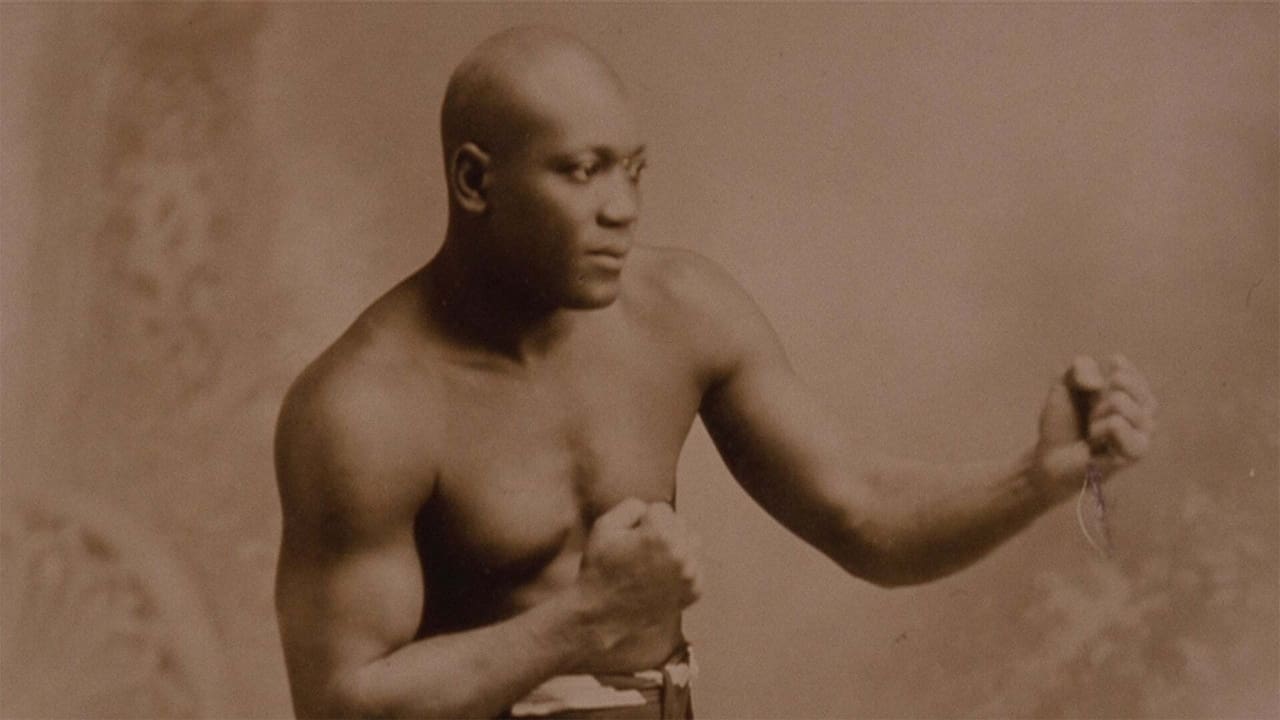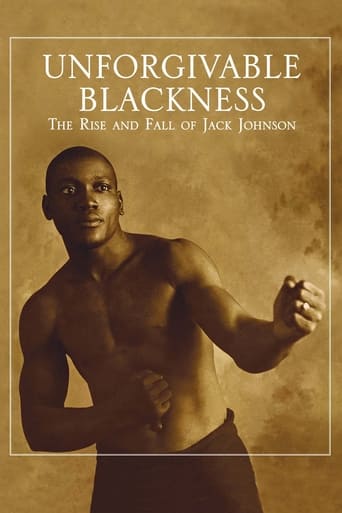

Save your money for something good and enjoyable
... View MoreThe performances transcend the film's tropes, grounding it in characters that feel more complete than this subgenre often produces.
... View MoreIt’s fine. It's literally the definition of a fine movie. You’ve seen it before, you know every beat and outcome before the characters even do. Only question is how much escapism you’re looking for.
... View MoreBy the time the dramatic fireworks start popping off, each one feels earned.
... View MoreThose looking for a sports documentary will be keenly disappointed. By relying on a ridiculously small number of commentators and sources, Ken Burns has put together a four hour indictment of white America for its past racism and intolerance. The sources not only are limited in number but only one of them--he late Burt Sugar--could claim real familiarity with boxing. And never was there anyone so in love with sound of his own voice. The man simply cannot shut up.The rest all are far-left hacks like Village Voice journalist Jack Newfield or like Stanley Crouch racial militants with nothing relevant to contribute but with a heavy political agenda leading to some very warped judgments about the era in which Jack Johnson lived and the man himself. While Jack Johnson was a great heavyweight, a real genius inside the ring, outside of it he was in no way the icon of racial struggle he is portrayed as here. Any comparisons to Muhammad Ali are far off base.Mike Tyson is the closest parallel with, below the waist, some Tiger Woods into the bargain, and while professional boxing recovered from Jack Johnson with great sportsmen like Gene Tunney and Joe Louis to later hold the title, Tyson has left such a bad smell that the prize ring probably will never recover its former luster.
... View MoreAs the author of a biography about Canadian heavyweight champion Tommy Burns, I can tell you Unforgivable Blackness didn't tell the whole story by portraying Tommy as a racist who had to be badgered into fighting Jack Johnson. Until Tommy Burns came along, all the heavyweight kings had been white Americans who openly drew the so-called 'colour line,' refusing to fight blacks. Tommy, who fought seven African-American boxers on his way up, announced the day that he won the title that he would take on all comers, regardless of race or religion. Among other things, Tommy Burns did the following: * Break the colour line by becoming the first white champ to fight a black boxer (Jack Johnson). * Become the first champ to give a Jewish boxer (Joseph Smith) a crack at the title. * Married a black woman. * Hire two black sparring partners. * Befriend and socialize with black fighter Billy Woods. Tommy Burns was a racist by the standards of 2007, often using the 'n' word in interviews. But by the standards of his era, he was a very progressive individual. And although director Ken Burns doesn't acknowledge it in his otherwise very good film, if it wasn't for Tommy Burns, no one alive today would know or care who Jack Johnson was. Dan McCaffery, author, Tommy Burns: Canada's Unknown World Heavyweight Champion
... View MoreARE SPOILERS POSSIBLE FOR HISTORICAL DOCUMENTARIES? IF SO, THERE MAY BE SOME HERE.This inaccurate, intellectually dishonest propaganda puff piece represents a new low for ultra-PCers Burns and Ward. They have done their mightiest to make a hero out of a self-indulgent thug, making a mockery out of historical reporting in the process.Jack Johnson was indeed a man of the future: he would fit right in with the egomaniacal, spoiled-rotten sports "heroes" that are so prevalent today. In a sense, he had great courage, demanding liberties and privileges that the society of his day (virulently racist, by today's standards) considered monumental affronts. But his brand of courage was more a form of supreme gall, borne by an overbearing sense of special entitlement. There can be little doubt his behavior promoted racism by appearing to confirm the worst fears whites held toward black men that they were, at heart, irresponsible brutes with an insatiable lust for white women. Contrary to the subliminal thesis here, Johnson was anything but a social reformer blazing a trail to freedom.Other heroic qualities are magnified out of proportion here, with editorial sleights-of-hand. Johnson's quotes come almost entirely from a ghost-written autobiography, making him appear more articulate than he really was. The herculean physical courage attributed to him is not confirmed by the facts: His first three fights after winning the belt in 1908 (McLaglan, O'Brien, Ross) were six-round, no-decision exhibitions; the fourth (Kaufman) was a ten-rounder of the same variety. The fifth was supposed to be an exhibition, but middleweight Stanley Ketchel got too frisky, so Johnson sent him to the oral surgeon. The phony nature of these fights goes unnoticed by the documentary, except for the Ketchel episode.Thus, Johnson's first real title defense was the 1910 bout against Jeffries, who had not fought in six years. Johnson held the crown for five years after this, during which he made only four defenses. By contrast, the man he dethroned Tommy Burns had made 12 defenses in the previous two years. (Interestingly, Burns weighed only 168 for the Johnson fight, about 10% below his normal fighting weight.) The film apparently ignores only one of Johnson's fights as champion a draw. That seems to be a telling omission. (Perhaps it was mentioned in passing ; I DID blink a couple of times.)In the end, Johnson was toppled by untalented strongman Jess Willard, and here Burns & Ward go unbelievably astray. They ascertain Willard was 27 at the time, "a full decade younger" than the champion. The challenger was actually 33, a fact Burns & Ward obliquely acknowledge earlier, if your arithmetic is better than theirs. They note at one place Willard began his boxing career the day after the Johnson-Jeffries fight (1910); a little later, they report Willard started boxing at 27. That would have made him 32 at Havana in 1915 almost correct.Was Johnson unmercifully persecuted by the government, as Burns & Ward claim? Yes and no. While the Mann Act was not inspired by the practice of rich men traveling with their in-house concubines, Johnson was clearly guilty of violating it. His selective prosecution probably had some racial motivation, but Johnson's violations were so blatant and well-publicized, he might well have been prosecuted if he had been white.Ken Burns' Civil War series (1990) was criticized by the PC lobby for being insufficiently anti-Confederate and driven by a white southerner (Shelby Foote). Ever since, he has been an increasingly obsequious afro-centric. It is getting pretty tedious.
... View MoreI saw this film at the 2004 Toronto International Film Festival. It may seem hard to believe, but I've never seen a Ken Burns film. I've always meant to, of course, but watching a multi- part documentary series is something of a commitment. So I jumped at the chance to see an entire film in one sitting. Clocking in at an impressive 218 minutes (and including a short intermission and a lively Q&A session, I was in the theatre for almost 4½ hours), I was hoping that the quantity would be matched by the quality. I was not disappointed.Jack Johnson was a true original. The first black man to hold the heavyweight boxing championship, he was a self-assured man who dressed well, drove fast cars, and kept white women as girlfriends. While not unusual now, this was highly irregular a hundred years ago, at a time when black lynchings were at their peak and the press regularly printed offensive cartoons to go along with its racist rhetoric. In the ring, he was a highly intelligent boxer, favouring a defensive style unknown in his day. He was also incredibly sensitive and articulate, especially for a man with only five years of formal education. But the struggles Johnson faced were almost insurmountable. No white champion would agree to fight a black man. Jim Jeffries preferred to retire undefeated rather than face Johnson, and Johnson had to travel around chasing champ Tommy Burns, hounding him to give him a title shot. When Burns finally agreed to a fight in 1908 (for a purse of $35,000, an unbelievable sum in those days), the contest wasn't even close, with Johnson dancing around, taunting his opponent, and talking to people in the ringside seats. The police stepped in during the fourteenth round to prevent him from knocking out the badly beaten Burns.Johnson held the title from 1908 until 1915, with his most famous bout in 1910, against ex- champ Jeffries, whom he soundly defeated. This led to race riots all over the country, and many people were killed. From the moment he won the championship, it seemed that white society looked for ways to discredit him. The press were relentless, printing hostile editorials and calling for a "Great White Hope" who would return boxing's crown to its rightful place (and race). When a 37-year old Johnson finally lost the championship to Jess Willard, a giant man ten years his junior, it seemed to many that the black race had been taught an important lesson.Johnson's life was troubled, and he continued to face persecution from the press and even law enforcement, who prosecuted him on charges related to his "debauchery" with white women. He eventually served a year in prison. There would not be another black heavyweight champion until Joe Louis, 22 years later.This is a remarkable film for many reasons. First of all, in the little-known story of Jack Johnson, Burns has found a microcosm of the racial situation of the day, and one that has many echoes even now. Muhammad Ali, after seeing James Earl Jones portray Johnson in the Broadway play "The Great White Hope" (later made into a film), declared that Johnson's life story was similar to his own. A black man choosing to live as a free individual on his own terms is something that is still hard for some white people to tolerate.Burns' film is also remarkable for the way in which it uses actual archival film of Johnson's bouts. Using silent film, Burns and his crew have added sound effects such as crowd noise and the sounds of blows connecting, and it gives these scenes the visceral punch they require. Finally, the superb "talking heads" (including the late George Plimpton, James Earl Jones, and the witty Stanley Crouch) and voice talent (Samuel L. Jackson is the voice of Johnson; others include Billy Bob Thornton, Derek Jacobi, Brian Cox, and Alan Rickman) bring the extraordinary story of Jack Johnson vividly to life.As an added bonus, you get to hear James Earl Jones say "balls". Twice.(9/10)
... View More